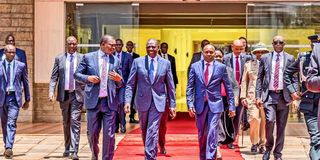Premium
President Ruto calls for a truce in ongoing police, Judiciary feud

CS Kithure Kindiki and CS Justin Muturi accompany President William Ruto during the launch of the Strategic Framework for the Implementation of reforms in the National Police Service (NPS), Kenya Prisons Service (KPS) and the National Youth Service (NYS) at the Kenya School of Government, Kabete on September 18, 2024.
What you need to know:
- He added that the ongoing fight between the Judiciary and the Executive was hindering the delivery of services.
- “We must defend our democracy and the rule of law. We must defend our independent institutions but we must also ensure we work together for the people of Kenya. And that requires leadership that understands that the independence is for serving the people of Kenya not interests of individuals. We need to ask for greater understanding and cooperation to achieve what is good for the people of Kenya without disagreement,” he said.
President William Ruto Wednesday weighed in on the ongoing feud between the Judiciary and the police, calling on both entities to work together to promote democracy and respect for the rule of law in the country.
Speaking during the launch of reforms for the police, Prisons and National Youth Service in Lower Kabete in Nairobi, he said that although the constitution provides for independence of these institutions, they must pursue the interest of Kenyans and not focus on what is “good” for one institution.
“The National Police Service is an independent institution and so is the Judiciary, but ultimately, we have one master who is the people of Kenya. And we must make sure that we work together towards serving not the interest of individuals but the collective interests of the people of Kenya.
“I want to ask for a much more harmonious engagement and relationship among our different arms of government and independent institutions so that we focus on what is not only good for one sector but for the greater good of the people of Kenya because that way we will serve the interest of the people of Kenya,” President Ruto said.
He added that the ongoing fight between the Judiciary and the Executive was hindering the delivery of services.
“We must defend our democracy and the rule of law. We must defend our independent institutions but we must also ensure we work together for the people of Kenya. And that requires leadership that understands that the independence is for serving the people of Kenya not interests of individuals. We need to ask for greater understanding and cooperation to achieve what is good for the people of Kenya without disagreement,” he said.
President Ruto also spoke on the importance of the rule of law.
“A country without respect for the rule of law will not and cannot guarantee itself as a democracy. Democracy runs on the engine of the rule of law,” he said in the presence on acting Inspector-General of Police Gilbert Masengeli, who is in the spotlight for defying court orders. He also withdrew the Justice Lawrence Mugambi’s security detail after the judge sentenced him to six months in jail for contempt of court.
President Ruto said the reforms he was launching would go a long way in building a “people-centered” approach in the delivery of services to Kenyans.
The reforms focus on the institutions, human capital and equipment. A committee on implementation of the reforms has already been put in place, bringing together all the arms of government. Challenges encountered during the implementation of the reforms will be resolved by the committee.
The reforms were proposed by a task force chaired by former Chief Justice David Maraga. The task force noted that apart from poor pay and funding, most of the endemic problems afflicting the police, Prisons and NYS could be attributed to poor leadership and institutionalised corruption.
The team recommended that laws be changed so that top officers in the disciplined services are appointed competitively rather than solely by the President or the responsible Cabinet secretary. This is meant to ensure that professionalism and competence determine selection rather than political affiliations, nepotism, corruption or other factors.
In the case of the police, the report noted that it is necessary to determine if the current top leadership has the competence, integrity and experience required to clean up the service. It recommended fresh vetting by an independent panel to be appointed by the President for all officers from the rank of senior superintendent of police and above.




